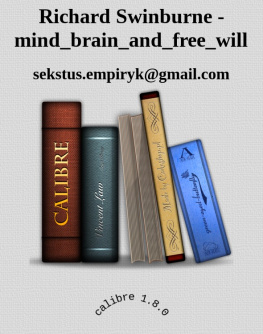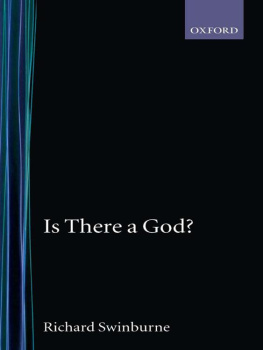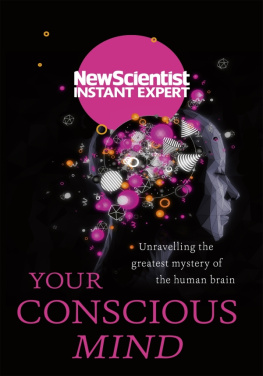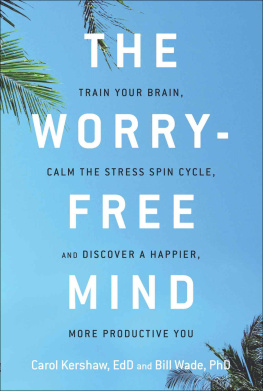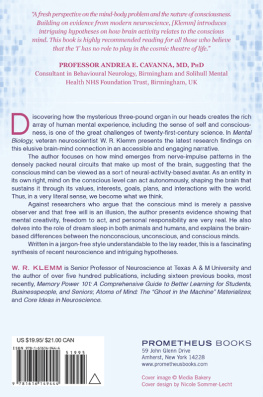Great Clarendon Street, Oxford, OX2 6DP
United Kingdom
Oxford University Press is a department of the University of Oxford. It furthers the Universitys objective of excellence in research, scholarship, and education by publishing worldwide. Oxford is a registered trade mark of Oxford University Press in the UK and in certain other countries
# Richard Swinburne 2013
The moral rights of the author have been asserted
First published in 2013
Impression: 1
All rights reserved. No part of this publication may be reproduced, stored in a retrieval system, or transmitted, in any form or by any means, without the prior permission in writing of Oxford University Press, or as expressly permitted by law, by license, or under terms agreed with the appropriate reprographics rights organization. Enquiries concerning reproduction outside the scope of the above should be sent to the Rights Department, Oxford University Press, at the address above
You must not circulate this work in any other form
and you must impose this same condition on any acquirer
British Library Cataloguing in Publication Data
Data available
Library of Congress Cataloging in Publication Data
Data available
ISBN 9780199662562(Hbk.)
ISBN 9780199662579(Pbk.)
Printed in Great Britain by
MPG Books Group, Bodmin and Kings Lynn
Links to third party websites are provided by Oxford in good faith and for information only. Oxford disclaims any responsibility for the materials contained in any third party website referenced in this work.
Contents
Preface vii
Preface
I discussed many of the issues of the present book in a previous book, The Evolution of the Soul (1986, revised edition 1997). With a few relatively small exceptions (the nature of the soul, discussed at the end of Chapter 6 of this book, being the main one), my conclusions on those issues remain the same. But many of the arguments by which I support those conclusions are different, andI believedeeper and stronger, based on a full discussion of underlying philosophical issues (e.g. the criteria for the identity of events and substances, and the grounds for asserting that a certain state of affairs is metaphysically possible) which underlie differences among philosophers about issues of mind and body. Also, this book includes a far fuller, and to my mind far more satisfactory, discussion than did The Evolution of the Soul, of what kind of free will humans possess; and in the process I have been able to take account in the present book of the important results of recent neuroscience about the brain mechanisms which underlie our intentional actions.
I have used some material from the earlier book, as well as material from several articles of mine published in the last few years: From Mental/physical Identity to Substance Dualism in (ed.) P. van Inwagen and D. Zimmerman Persons, Human and Divine, Oxford University Press, 2007, pp. 14265; Che cosa mi rende me? Una difesa del dualismo delle sostanze in (ed.) A.Lavazza, LUomo a Due Dimensioni, Bruno Mondadori, 2008; Could anyone justifiably believe epiphenomenalism?, Journal of Consciousness Studies, 18 no 34 (2011), 196216; Dualism and the Determination of Action in (ed.) Richard Swinburne, Free Will and Modern Science, British Academy, 2011; and How to determine which theory of personal identity is true in (ed.) G. Gasser and M.Stefan, Personal IdentitySimple or Complex?, Cambridge University Press, 2012. Thanks to the editors and/or publishers of these articles for permission to reuse their material. I am most grateful to the two anonymous referees who produced valuable comments on a penultimate draft of this book, as also to those many philosophers with whom I have argued about the issues over numerous years. And my thanks finally to Sarah Barker for typing and retyping earlier versions of the book, and to Peter Momtchiloff for welcoming yet another book of mine and guiding it through the publication process.
Introduction
The focus of this book is the nature of human beings whether we are merely complicated machines, or souls interacting with bodies; and what follows from this for whether we have free will in a sense which makes us morally responsible for our actions. But I think that we cannot make much progress in these two well explored fields without discussing certain very general preliminary issues of metaphysics and epistemology.
So Chapter 1 is devoted to the general issue of what sorts of things there are, and what are the criteria for one such thing being the same as another such thing. I distinguish three kinds of thing: substances (the constituents of the world such as electrons, planets, and houses), their properties (such as weighing 1000 kg, or being spherical), and events (occurrences at particular times, which consist in substances having or changing their properties). I then consider what are the criteria for two substances, properties, or events being the same substance, property, or event. I must ask those readers who are not professional philosophers to be patient with what might seem the rather abstract hair-splitting arguments of this chapter. For only with clear criteria for the identity of substances, events, and such like can we answer questions about whether mental events are merely brain events (i.e. the same events as brain events), or whether I am the same thing (same substance) as my body. In Chapter 2 I consider what makes a belief that a certain event occurred or that a certain scientific theory is true, or that some proposition is possibly true, a justified (or rational) belief. And again I have to ask those readers who are not professional philosophers to be patient, as the full relevance of my conclusions on these issues will only be apparent later in the book. For it is only when we have a satisfactory account of what makes such beliefs justified, that we will be in a position to assess the justification of a scientific theory that our intentions do or do not cause brain events; or the justification of the claim that (in a certain sense of possible) it is possible that I could lose all of my present body and acquire a very different one.
Equipped with important metaphysical and epistemological results, I then come in Chapters 37 to examine the relation of our life of thought and feeling to what happens in our brains and so in our bodies. I argue in Chapter 3 that there are two kinds of event in the worldphysical events (including brain events) and mental
2 MIND , BRAIN , AND FREE WILL
events. Mental events are events to which the subject (the person whose events they are) has privileged access, that is, a way of knowing about them not available to others. Among mental events are pure mental events, ones which do not include any physical event. Among these are beliefs, thoughts, intentions, desires, and sensations, events of which the subject is often conscious and which are then conscious events. I go on in Chapter 4 to argue that not merely do brain events often cause mental events, but mental events (and in particular intentions) often cause brain events, and thereby bodily movements. Many neuroscientists have interpreted the results of recent neuroscientific experiments as showing that our intentions do not cause brain events. I argue that these results do not show that, and that no experimental results of any kind could possibly show that.
In Chapter 5 I argue that this result, that intentions often cause our brain events, needs to be expressed more carefully as the result that persons often cause brain events when they intentionally cause bodily movements. In current philosophical terminology, persons are agent-causes. Philosophers and scientists often assume that the causes of events are other events, logically distinct from them; for example, that when the ignition of dynamite causes an explosion, the ignition is a separate event from the explosion, and there is a law of nature (a consequence of the fundamental laws of chemistry) which determines that an event of the first kind is followed by an event of the second kind. I now argue that, whatever might be the case with non-intentional causation (e.g. the ignition of gunpowder causing an explosion, or a brain event causing pain), in intentional causation the cause is the person whose intention it is, a substance and not an event. A person having an intention (in acting) is simply that person intentionally exercising causal power. In Chapter 6 I move on to the issue of the nature of the substance, the human person to whom pure mental events (including intentions) belong. I argue that each human is a pure mental substance, having a soul as their one essential part and a body as a non-essential part; physical properties belong to humans in virtue of belonging to their bodies, and pure mental properties belong to them in virtue of belonging to their souls. Whether or not it is physically or practically possible for the present body of any human to be destroyed and yet for their soul to continue to exist, my claim is that it is compatible with what we essentially are that any human should continue to exist without their present body or any body at all; and so each of us is essentially a pure mental substance. I claim that the arguments in favour of this view, called substance dualism, that we are essentially pure mental substances, aredespite its current extreme unpopularitycompelling. Some of the modern hostility to substance dualism arises from the feeling that it leads to the view that having a body and bodily well-being are unimportant. But substance dualism in no way entails that; and I myself certainly hold that having a body is necessary for a worthwhile human existence, and that pleasure arising from bodily causes is a good thing. Substance dualism is a doctrine about what is necessary for our existence, not about what makes for a full and worthwhile life.

